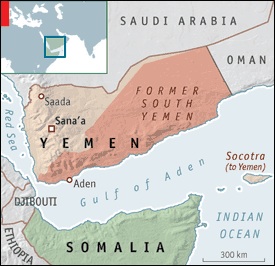In the Yemeni capital of Sanaa, the so-called “Houthi rebels” are flying the flag of Yemen. This is true not just in Sanaa, but Saada and several other cities under the control of the Shi’ite faction. Meanwhile, in Aden, the “temporary capital” of the Saudi-backed “government-in-exile,” the only flags you see, apart from the ones put up by encroaching al-Qaeda fighters, are the flags of South Yemen.
 Saudi Arabia and their allies got into this war with a vision of reinstalling Gen. Abd-Rabbu Mansour Hadi, a former president who resigned in January, in power across the whole nation. Yet Hadi is from South Yemen’s Abyan, and when the Saudis launched the war the remnants of his forces were clustered around the south. Since then, the support they’ve gotten has come from Sunni tribesmen, up for the sectarian nature of the conflict, but also predominantly from the south.
Saudi Arabia and their allies got into this war with a vision of reinstalling Gen. Abd-Rabbu Mansour Hadi, a former president who resigned in January, in power across the whole nation. Yet Hadi is from South Yemen’s Abyan, and when the Saudis launched the war the remnants of his forces were clustered around the south. Since then, the support they’ve gotten has come from Sunni tribesmen, up for the sectarian nature of the conflict, but also predominantly from the south.
As the war stalemates along Maarib and Taiz, it is becoming increasingly clear that this battle is being set up not so much along Sunni-Shi’ite lines, but on the north-south divide, and the southern secessionists Hadi was opposing during his brief term in power are the only major domestic allies he has.
The south had been trying to reassert itself for some time, eying a return to a capital in Aden during the last years of President Saleh’s reign, and during Hadi’s. Hadi has ironically now found himself the leader of de facto South Yemen, and engaged in the very same war with a northern power that saw the nation torn apart throughout the early 1990s.
Even more interestingly, former President Saleh, who oversaw the northern side of this war the last time, looms large in the fixture of northern factions once again, despite his long-standing hostility toward the Houthis. He was targeted early and often by the Saudis, and has called on his supporters, many of whom remain in the military, to oppose the Saudi-backed forces in the south.
While both sides publicly maintain that they intend to keep Yemen unified, the split has already happened in most practical ways, and it’s unlikely the southerners will accept being retaken by the northern forces, nor that the Hadi government, which has already publicly announced it is moving its capital “temporarily” to Aden, can really rule the north from there.


